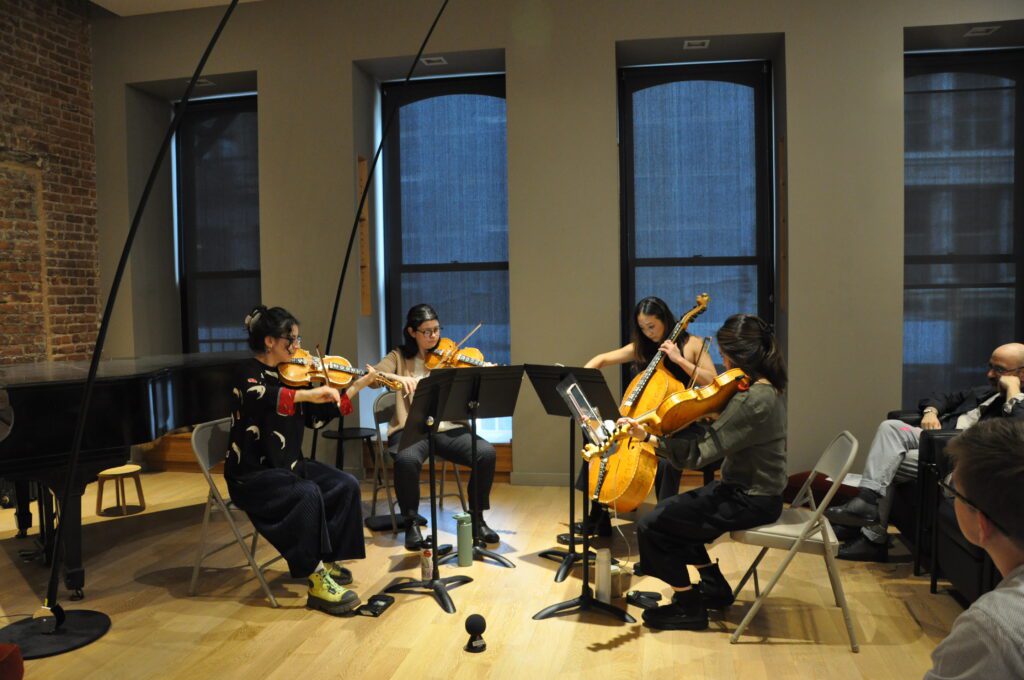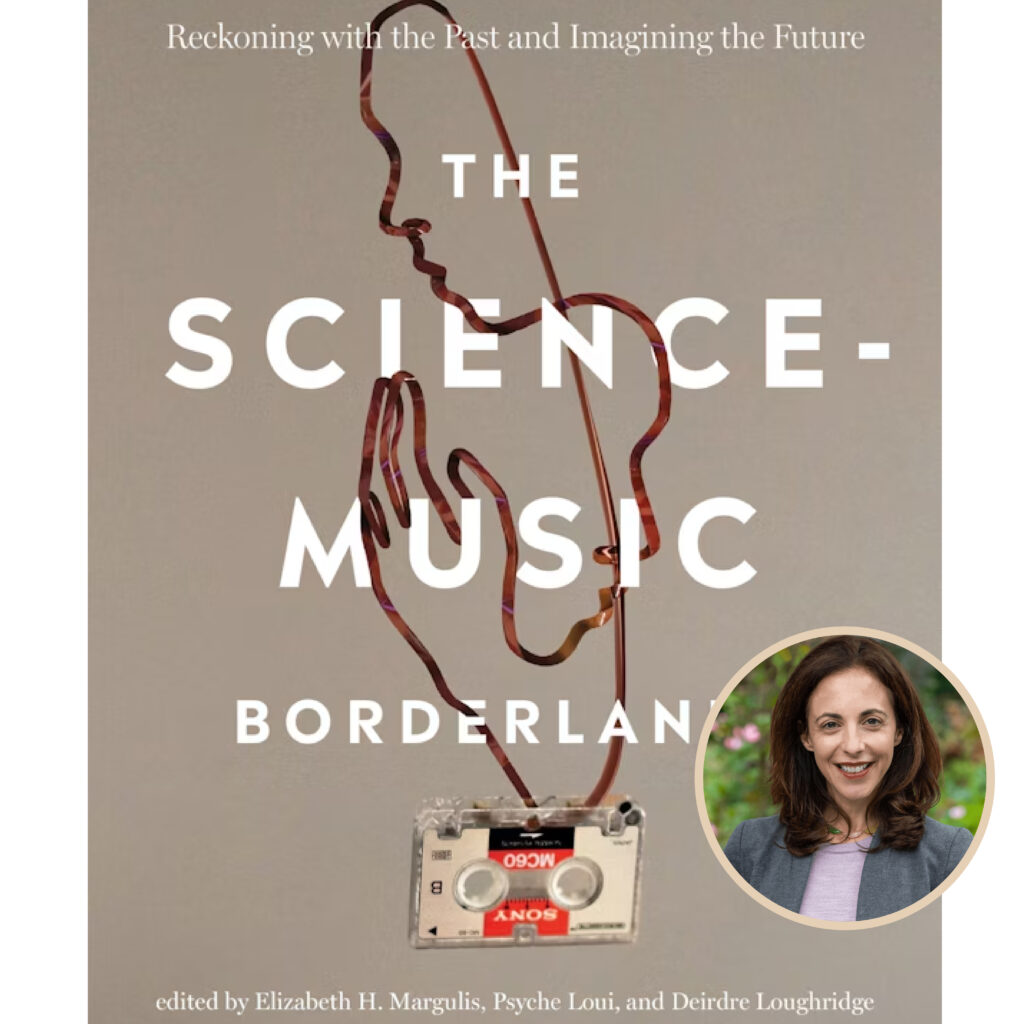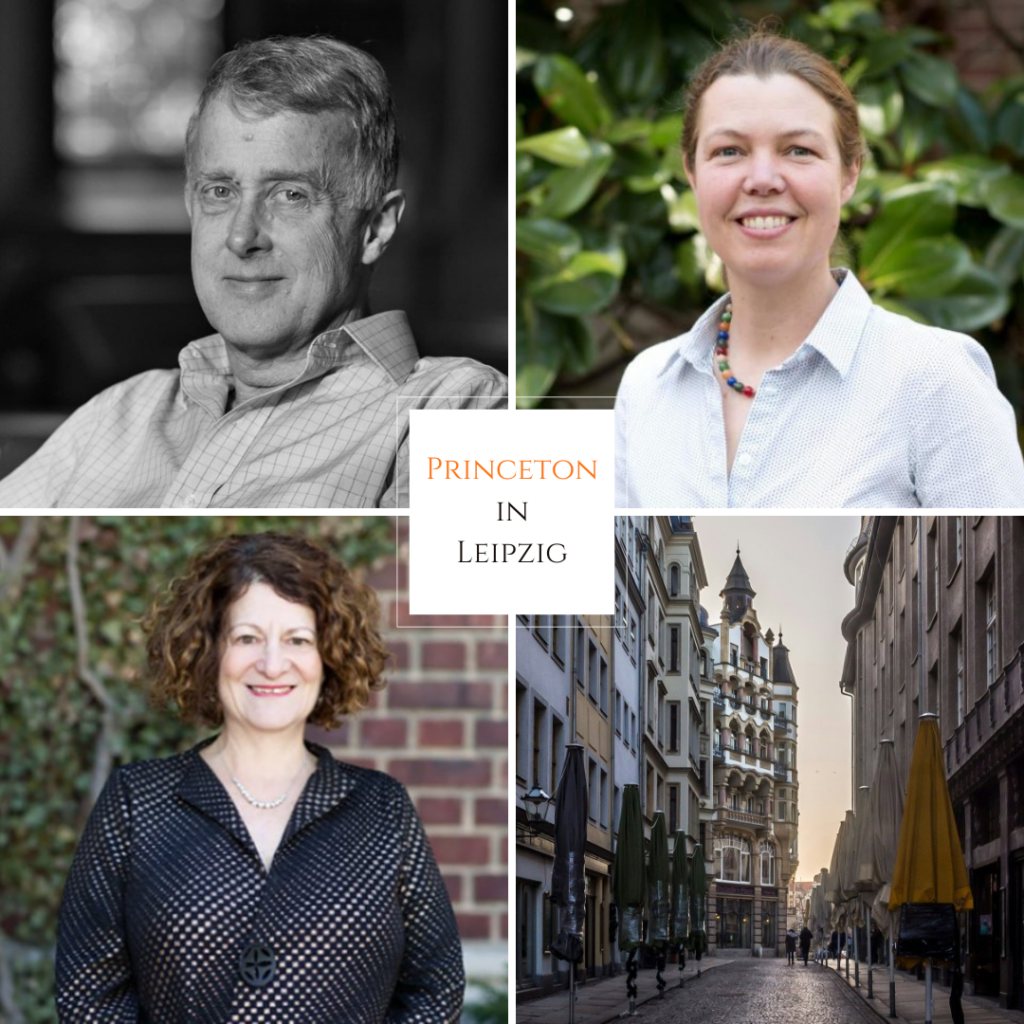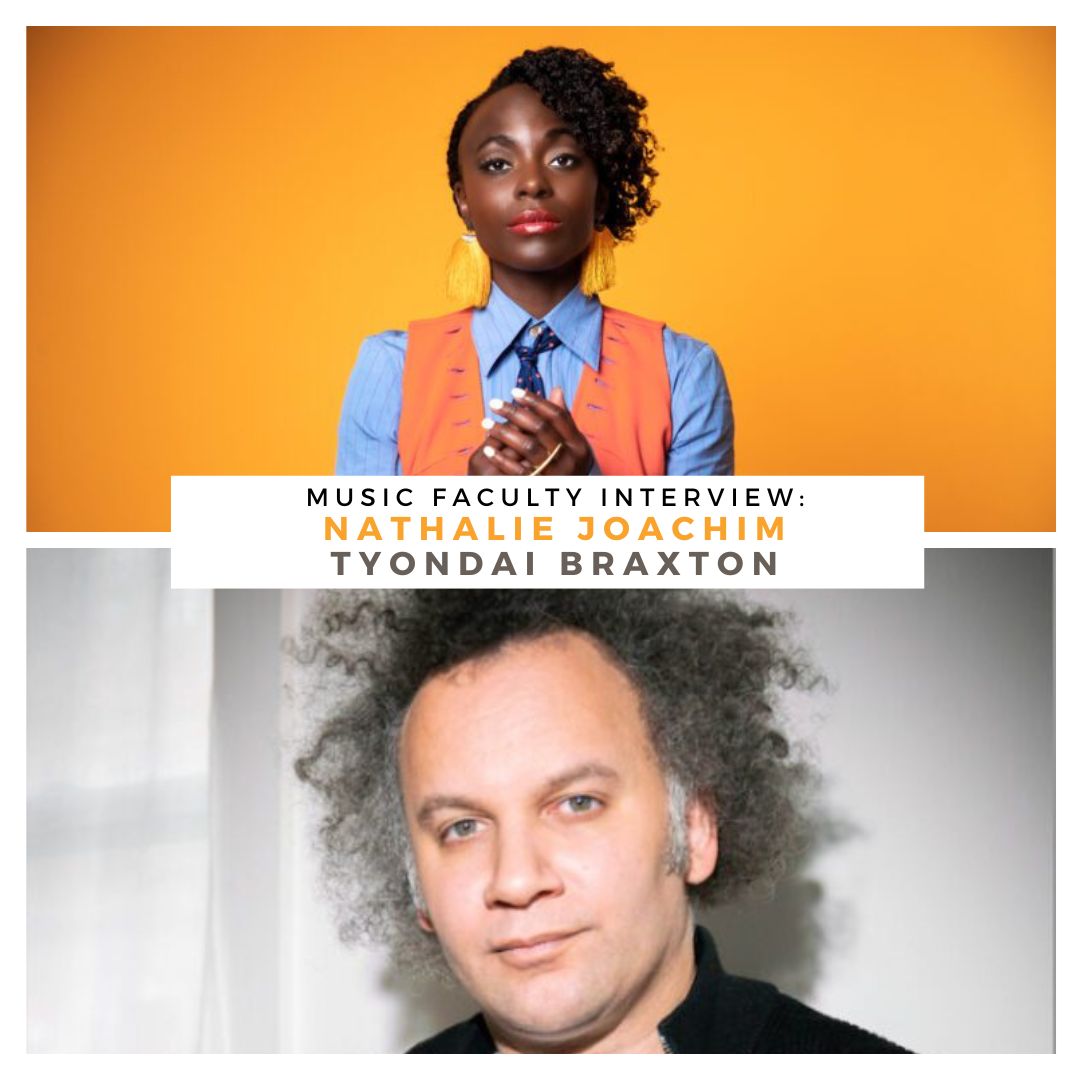Walking the hallways of the Woolworth Music Building, snippets of sound escape through doors left slightly ajar. Stealing away from first-floor classrooms, the harmonies of musical works (sometimes recorded, sometimes live) drift alongside chords tinkered on piano, professors lecturing, and the buzz of classroom conversation. Upstairs, echoes of music recede, eclipsed by the rustle of paperwork and the ever-present click-clacking of keyboard typing. It was this rhythm, energetic and persistent, that greeted us one quintessentially autumnal Princeton day when the inviting soprano of Nathalie Joachim’s “Come on in!” welcomed us into her office for a chat.
Over a year has swiftly passed since Nathalie Joachim and Tyondai Braxton joined the faculty of the Department of Music in Fall 2022. We were eager to catch up and share how these two dynamic musicians have been shaping the academic and creative landscape both within and beyond the classroom.
As we entered her office, Joachim was just finishing up an email to a student, a Biology major who had reached out seeking advice for a new project on the sonification of data. Joachim, who’d taught the student in MUS 105, had an admittedly generic answer to give, but knowing the student would be better served by her colleagues Dmitri Tymoczko and Dan Trueman, she connected the dots instead.
“In our department, everyone studies with everyone. There’s no hierarchy — and that’s refreshing. Our faculty are all extremely supportive, and I genuinely believe that each one of us excels uniquely in our field.” —Joachim
This serendipitously-timed vignette spoke to the ethos of mutual support that is the cornerstone of the Department of Music.
For Tyondai Braxton, who spent over two decades as a touring artist and composer and living in Brooklyn, Princeton emerged as the missing piece in his professional puzzle. “It’s fulfilling and healthy in a way that I’m really enjoying,” he shares. “The environment is both idyllic and conducive to doing good work, in my teaching and also my creative practice.”
Joachim, who transitioned from a busy schedule of guest lecturing, teaching, and performing (including with the chamber ensemble Eighth Blackbird for nearly eight years in Chicago), values being back on the East Coast (she’s originally from Brooklyn) and the logistical ease it offers for her touring commitments. “Adding a full-time teaching position was definitely an adjustment,” she admits, “but a good one.”
The transition from touring musician to professor can be daunting, yet Joachim and Braxton found their stride through collaborative teaching. Early co-teaching experiences with colleagues set them up to, as Braxton describes it, “take the training wheels off” later. Braxton’s first solo course in 2022, MUS 316, on computer and electronic music composition, may have felt “death defying” at the time, but being able to “build off of different colleagues approaches to teaching,” Braxton admits, was a help.
“There was one assignment that Jeff Snyder, the previous professor for MUS 316, had created in which the students had to synthesize animal sounds using electronics, that just brilliantly unlocked a dimension of humor you would not usually associate with the ‘cold-hearted calculations’ of electronic music composition. It was helpful to build off of his scaffolding.” —Braxton
Similarly, when Trueman approached Joachim in Spring 2023 about teaching the longstanding MUS 105 introductory music theory course the following fall, she had to quickly ready herself to dive in without the floaties. “When Dan first asked me if I’d teach 105, I declined. Coming from a rigorous classical background, I have an association with music theory that is not exactly positive; there was always a disconnect between my embodied, human experience of music and this cerebral contextualization of music. I had a lot of cognitive dissonance on the subject. And of course, Dan said, ‘Well, that seems like precisely the reason why you should be teaching this class.’”
Having been convinced, Joachim quickly got to work. She shifted the focus of the graduate course, MUS 534, she’d been teaching, turning it into a think tank.
“I posed the question: If we threw the whole system away and looked at all musics on an equal playing field, what would that look like?” —Joachim
Many of the participants in her “think tank” ultimately became preceptors for the revamped MUS 105, for which units now include topics like music literacy, cultural context, pitch, rhythm, and timbre and musical works studied include, for example, Gabriella Smith’s Carrot Revolution.
In 2023-24, Joachim also took over as interim director of Princeton Sound Kitchen, the concert series for graduate student composers to workshop and showcase their work alongside high-level guest artists and ensembles, while director Donnacha Dennehy was on sabbatical.
Beyond their classroom duties, Braxton and Joachim remain active practitioners in the field. In November 2022, a mere three months following his appointment, Braxton celebrated the release of Telekinesis, an electroacoustic orchestral work about eight years in the making, on New Amsterdam & Nonesuch Records. This was followed in short order by a Carnegie Hall premiere by Third Coast Percussion: Sunny X, for percussion and electronics. (The ensemble’s subsequent album release, of which Braxton’s Sunny X is a part, was nominated for a Grammy.) And a new record with composer/sound artists Ben Vida and Jefre Cantu-Ledesma is soon to follow.
Joachim’s 2023-24 academic year has been a banner year. Her bilingual album Ki moun ou ye, co-released on February 16, 2024 by Nonesuch and New Amsterdam records, is one she feels is “foundation shifting.” Exploring what it means to be a person of the diaspora, the album (the title of which asks “who are you”) samples Joachim’s voice as a way of exploring both the uniqueness of the voice and the inheritance our voices hold. “Every single song is born out of a foundation of samples from my voice elsewhere on the record. The only exception to that is the very first song that I wrote, which uses tiny samples of my grandmother’s voice. That is a carry over from my last record, Fanm d’Ayiti, which celebrated the Haitian female artists who changed the fabric of the music industry in Haiti and commemorated my grandmother, my first music teacher.”
“I think this album is going to be a foundation shifting work for me in many ways. And Princeton funding really helped me complete it, covering not only the recording of the album but all the post production costs.” —Joachim
Following an album release celebration at MoMA on February 21, 2024, Joachim shifts gears to her next recording, Solitude + S P A C E, an evening length work for voice, flute and violin and electronics, followed by a recording of a project composed last season for Flutronix. Like Braxton, Joachim has two pieces on a Grammy-nominated album, Difficult Grace by Seth Parker Woods, for whom she is currently composing a concerto (as she is for Melissa White, violinist of the Harlem Quartet). 2023-24 has also already seen the premiere of her first piece “on the big Carnegie [Hall] stage,” performed by Orpheus Chamber Orchestra.
With hectic performing, recording, and composing schedules, both have had to adjust to the push and pull inherent to balancing professorial with other artistic duties — which, of course, sometimes entails making temporary sacrifices. In Fall 2023, for example, when Braxton ventured into new territory still with STC/MUS 204, an undergraduate course on instrument-building, he dedicated his time entirely to what he recognized would be a “big lift,” tempering the number of outside gigs he took on so he could focus his attention on the course.
Yet the rich fabric of artistry the two regularly weave in their respective professional lives feeds back amply into their teaching. In MUS 341, a course on atonality and noise that he co-taught with Dmitri Tymoczko in Fall 2023, Braxton brought up Telekinesis as “a piece that has its own kind of novel way of working with harmony and texture, particularly through the lens of atonal music making.” In MUS 204, he frequently weaves in anecdotes and learnings from his own electronic practice, particularly in modular synthesis: “It’s so abstract, not only technically, in that it’s difficult to get your head around, but also philosophically, in that it’s a totally different way of thinking about music making. So, we talk about what it means to build and design these instruments and how the design implications shape our philosophical approach to writing music.”
“A lot of the ideas that I bring to bear in my classes are things that I’m excited about or conversations I’ve had with friends. Teaching gives me a space to formalize some of these ideas.” —Braxton
Joachim’s artistic connections have also been the wellspring of a rich mutual exchange with the department’s music library. “I am a deep lover of our Mendel Library. The librarians have helped me source a lot of the scores for [MUS] 105. I’ve also been in the position to facilitate conversations between living artists and the librarians, so that we can get scores that aren’t yet published into the library.”
And of course, inspiration from the academic space (including the graduate composition lessons Joachim and Braxton both teach) bleeds into their creative practice, too. “When you have artists of this caliber,” Braxton shares, “graduate students who are all coming from different places — culturally, philosophically, artistically — artists who are trying to open doorways to different parts of their practice, you can learn a lot as well.”
“For me, artistically and pedagogically,” Joachim effuses, “the thing that I’m trying to do as a teacher is to get people to step closer to themselves.” Braxton, equally energized, brings the idea full circle: “I want to facilitate a situation where a student can find out something about themself — something that they can bring to bear elsewhere.”
“The humanities are about learning what it means to be resourceful in your creativity and then being able to apply that in the real world.” —Braxton
In Other News

Resonant Revival: How a Norwegian Folk Fiddle Found a New Voice at Princeton
May 19, 2025
Dan Trueman, Chair of the Music Department, introduces Norwegian folk instruments to a new generation of composers and performers.

Elizabeth Margulis on the Frontiers of Music Cognition
Jan 22, 2025
The Department of Music is thrilled to congratulate musicology professor and Director of Graduate Studies Elizabeth Margulis, who has received the Ruth A. Solie Award for her editorial contributions to The Science-Music Borderlands: Reckoning with the Past and Imagining the Future.

Announcing the Launch of Princeton in Leipzig
Jan 7, 2025
Enrollment in “Princeton in Leipzig” has been extended to March 2, 2025! The Princeton Music Department is excited to announce the launch of Princeton in Leipzig, a summer study abroad …

